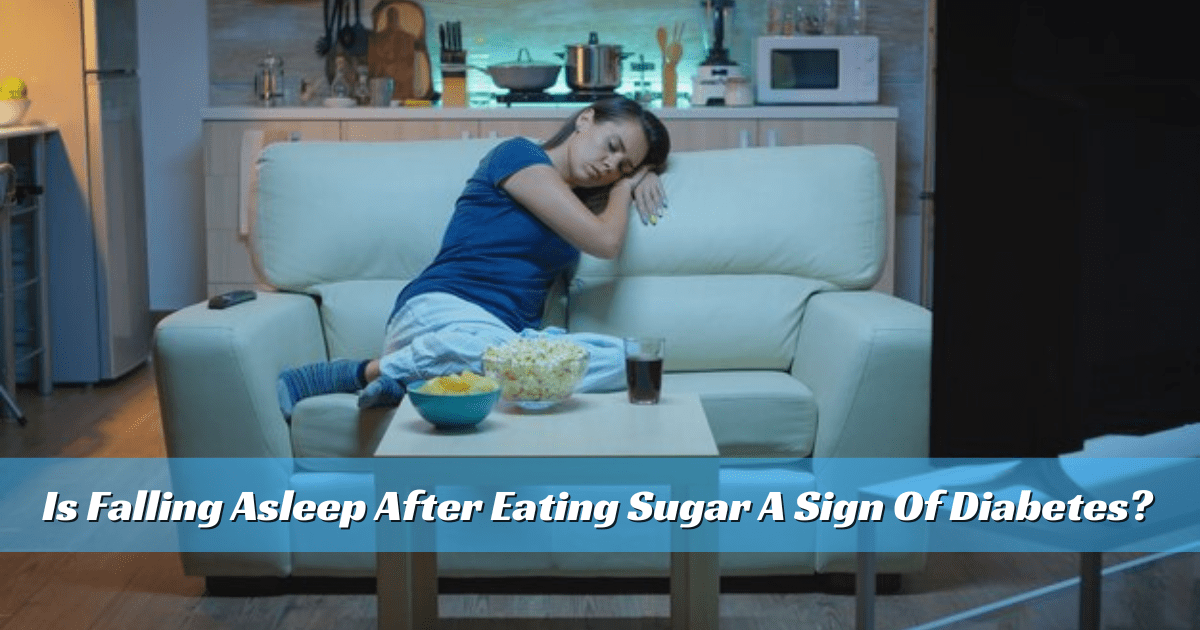Understanding diabetes symptoms is critical for early detection and treatment of this chronic condition. is Among the different symptoms, there has been speculation about whether falling asleep after eating sugar implies a sign of diabetes. In this post, we will look at the relationship between sugar consumption, tiredness, and diabetes to help you understand it better.
Sleepiness after eating is a typical phenomenon and not always associated with diabetes. Let’s investigate this further:
- General Sleepiness After Eating:
- Many people report feeling drowsy or in a “food coma” after a meal.Various factors, such as nutrition and lifestyle, can impact this.
- The natural process of digestion can cause minor tiredness after eating, particularly if you ate a carbohydrate-rich meal.
- So, feeling exhausted after a meal does not always signify diabetes.
- Diabetes and Sleepiness:
- Tiredness is a common symptom of type 1 and 2 diabetes.
- Diabetes-related fluctuations in blood sugar levels can produce weariness. Fluctuations in blood sugar levels include hypoglycemia (low) and hyperglycemia (high).
- Hyperglycemia can develop after eating carbs (which contain sugar), causing blood sugar increases.
- People with diabetes may experience hypoglycemia after skipping a meal or engaging in strenuous exercise.
- Other diabetes symptoms include increased thirst, hunger, hazy vision, tingling in the hands and feet, slow-healing wounds, and unintentional weight loss.
- Sugar and Sleepiness:
- Consuming sugars (carbohydrates) can cause blood sugar levels to rise, potentially leading to tiredness.
- Carbohydrates can also trigger a “sugar crash,” which is a decline in blood sugar levels and energy following an initial surge. This decline is referred to as reactive hypoglycemia.
- A 2019 meta-analysis found that carbohydrate consumption was associated with increased weariness and lower alertness.
Sugar Consumption and Blood Sugar Levels
Sugar, in its different forms, serves as the body’s major source of energy. When ingested, it is converted into glucose, which enters the bloodstream and causes a spike in blood sugar levels. However, the body regulates blood sugar levels by releasing insulin, a hormone produced by the pancreas. Under normal conditions, this mechanism keeps blood sugar in a healthy range.
What is Diabetes?
Diabetes is a chronic health disorder characterised by elevated blood sugar levels (glucose). This occurs when the body does not create enough insulin (a hormone that regulates blood sugar) or when the cells in the body do not respond appropriately to insulin.
Diabetes is classified into numerous forms, including type 1, type 2, and gestational diabetes. Diabetes is normally managed with a combination of medication, lifestyle adjustments (such as diet and exercise), and regular blood sugar testing to avoid complications.
Symptoms Of Diabetes
Diabetes symptoms vary according to the kind of diabetes and the individual. However, common symptoms can include:
- Frequent urination: High Blood Sugar Levels and Health Risks.
- Frequent Urination: High blood sugar levels can cause nocturia, a nighttime urination.
- Increased thirst: Excessive urination can lead to dehydration, causing thirst.
- Unexplained Weight Loss: Insufficient insulin leads to weight loss due to fat and muscle burning.
- Increased Hunger: Insufficient insulin leads to increased appetite.
- Fatigue: Depleted cells can cause fatigue.
- Blurred Vision: Fluid drawn from eyes can cause blurred vision.
- Slow-Healing Sores or Recurrent Infections: Excess sugar can hinder wound healing and infection prevention.
- Tingling or Numbness in Hands or Feet: Damaged blood vessels and nerves can cause diabetic neuropathy.
It’s important to know that some people with type 2 diabetes might not feel any different, or they might only have a few small signs that they don’t notice.
Postprandial Somnolence
Postprandial somnolence, often known as food coma, is the drowsiness or lethargy that occurs after eating a meal, especially one high in carbohydrates or sweets. While this occurrence is benign and typically transient, it has prompted concerns regarding its link to diabetes.
Link Between Sugar and Sleepiness
High sugar intake might cause variations in energy levels. While sugary foods may provide an initial surge of energy, they are frequently followed by a rapid drop in blood sugar levels, which causes exhaustion or sleepiness. According to research, high sugar consumption might alter sleep patterns and contribute to daytime weariness.
Can Diabetes Play A Role In Falling Asleep After Eating?
Yes, diabetes can contribute to feeling drowsy after eating, especially in people with specific forms of diabetes or those whose blood sugar levels fluctuate dramatically.
Postprandial Hypoglycemia:
Sometimes, especially in diabetics who use certain medications such as insulin or sulfonylureas, their blood sugar levels decrease dramatically after eating.
This is known as postprandial hypoglycemia. When this happens quickly, you may feel weary, disoriented, unsteady, or even extremely sleepy. Some people wonder if falling asleep after eating anything sugar indicates sign they have diabetes.
Insulin Resistance and Fatigue:
Type 2 diabetes occurs when the body becomes insulin resistant or does not create enough insulin, impairing glucose uptake by cells. After eating, blood sugar levels rise, but if insulin resistance exists, cells may not respond to insulin adequately, resulting in weariness or sleepiness as cells are starved of energy.
Digestive Process:
Following a meal, the body increases blood flow to the digestive tract to aid in digestion and nutrient absorption. This can restrict blood flow away from the brain, causing temporary drowsiness or lethargy.
Overeating:
Large, high-carbohydrate meals can cause a surge in blood sugar followed by a dip, a condition known as reactive hypoglycemia. This rapid change in blood sugar levels might cause sensations of weariness or sleepiness.

What Causes People With Diabetes To Be Tired?
Several causes can lead to weariness in people with diabetes:
- Blood sugar fluctuations: Fluctuations in blood sugar levels, particularly those that are excessively high or too low, might contribute to fatigue. High blood sugar levels can cause dehydration and weariness. Low blood sugar, also known as hypoglycemia, makes you feel weak, shaky, and tired.
- Insulin resistance: In type 2 diabetes, the body’s cells may develop resistance to the actions of insulin, making it difficult to use glucose for energy. This can lead to sensations of exhaustion because cells are deprived of the energy they require to function properly.
- Poor sleep quality: Diabetes can disrupt sleep patterns, resulting in poor sleep quality or sleep disorders including sleep apnea. A lack of restful sleep can lead to daytime exhaustion or fatigue.
- medicines: Some diabetes treatments, such as insulin or certain oral medicines, can produce fatigue.
- Obesity: Many people with type 2 diabetes are overweight or obese, which can lead to exhaustion from the burden extra weight puts on the body, as well as potential sleep difficulties.
- Underlying health conditions: Diabetes raises the chance of developing cardiovascular disease, renal disease, and neuropathy, all of which can cause weariness.
- Stress and mental health: Living with diabetes can be stressful, and stress can increase fatigue. Furthermore, people with diabetes are more likely to suffer from mental health issues such as depression and anxiety, which can add to fatigue.
Why Do People With Diabetes Feel Sleepy After Eating?
People with diabetes may experience sleepiness after eating for a variety of reasons.
- Postprandial Hypoglycemia: In some situations, particularly in diabetics who use specific drugs such as insulin or sulfonylureas, blood sugar levels can drop excessively low after a meal, resulting in a condition known as postprandial hypoglycemia. This quick drop in blood sugar can result in symptoms such as weariness, dizziness, shakiness, and, in some circumstances, excessive drowsiness.
- Insulin Resistance and Fatigue: Type 2 diabetes occurs when the body becomes insulin resistant or does not create enough insulin, impairing glucose uptake by cells. Blood sugar levels rise after eating, but if insulin resistance exists, cells may not respond adequately to insulin, resulting in a sense of exhaustion or sleepiness as cells are deprived of energy.
- Digestive Process: Following a meal, the body increases blood flow to the digestive tract to aid in digestion and nutrient absorption. This can restrict blood flow away from the brain, causing temporary drowsiness or lethargy.
- Overeating: Large, heavy meals, particularly ones high in carbohydrates, can induce a surge in blood sugar followed by a dip, a condition known as reactive hypoglycemia. This rapid change in blood sugar levels might cause sensations of fatigue or sleepiness.
People with diabetes must monitor their blood sugar levels, particularly when eating. It is critical to eat balanced meals with the appropriate amount of food to help control blood sugar and avoid feeling fatigued or sleepy after eating.
Hypoglycemia vs. Hyperglycemia
Both low and high blood sugar levels might result in weariness and drowsiness. Hypoglycemia occurs when blood sugar levels fall too low, which is frequently caused by an overabundance of insulin or an insufficient diet.
Hyperglycemia occurs when blood sugar levels rise, which is usually caused by insulin resistance or inadequate insulin synthesis.
Is Sleepiness A Sign Of High Blood Sugar?
Yes, tiredness can be an indicator of high blood sugar levels in some diabetics. When blood sugar levels rise, the body may be unable to efficiently use glucose for energy due to insulin resistance or insufficient insulin synthesis.
As a result, cells may not receive the energy they require to perform correctly, causing sensations of exhaustion or sleepiness.
When your blood sugar levels become too high, you may feel extremely thirsty and lose fluids, making you feel even more lethargic or lazy. People with diabetes should regularly check their blood sugar levels and pay attention if they feel fatigued or sleepy, as this could indicate that their blood sugar is fluctuating significantly.
How To Feel Less Tired After Eating
To feel less exhausted after eating, especially for people with diabetes, explore the following strategies:
- Consume balanced meals with a variety of carbohydrates, protein, and healthy fats to slow carbohydrate digestion and absorption.
- Monitor portion sizes to avoid overeating and maintain consistent energy levels.
- Limit refined carbs to whole grains, fruits, vegetables, and legumes for long-term energy and fibre.
- Stay hydrated by drinking plenty of water throughout the day and limiting sugary drinks.
- Include protein and fiber-rich foods to regulate blood sugar levels and increase fullness.
- Manage stress through activities like deep breathing, meditation, yoga, or nature time.
- Be cautious of alcohol as it can disrupt sleep patterns and contribute to feelings of exhaustion.
- Take a short walk after meals for digestion and energy levels.
- Prioritize adequate sleep to prevent feelings of exhaustion and fatigue.
- Consult a healthcare professional if fatigue persists after eating, especially if you have diabetes.
Managing Tiredness And High Blood Sugar After Meals
Diabetes Management Strategies
- Regular blood sugar monitoring.
- Eating low-glycemic foods.
- Controlling portion sizes.
- Eating balanced meals with carbohydrates, protein, and healthy fats.
- Staying hydrated.
- Managing stress through techniques like deep breathing, meditation, yoga, or nature.
- Engaging in physical activity.
- Taking prescribed medication.
- Consulting with a healthcare professional if persistent tiredness and high blood sugar persist.

Read More: Does Almond Milk Cause Constipation? Let’s Find Out
Conclusion
While falling asleep after eating sugar is common, it does not necessarily indicate diabetes. However, prolonged fatigue or severe weariness, especially when combined with other symptoms, requires additional evaluation. Understanding the link between sugar consumption, sleepiness, and diabetes is critical to improving general health and well-being.
Frequently Asked Questions
Why do I feel sleepy after consuming sugary foods?
When we eat sugary foods such as candy or cake, our systems release a hormone known as insulin, which helps our cells use the sugar for energy. When there is too much sugar in our blood, our bodies produce more insulin, which causes us to feel fatigued or sleepy.
Does feeling tired after consuming sugar indicate that I have diabetes?
Not necessarily. Feeling tired after eating sugar can happen to anyone, especially if we consume a large amount of sweet meals at once. However, if you frequently feel weary or sleepy after eating sugar, you should consult a doctor to ensure that everything is fine with your health.
What are some more symptoms of diabetes?
Diabetes can create symptoms other than sleepiness after ingesting sugar. Some common symptoms include extreme thirst, frequent urination, unintentional weight loss, constant hunger, and blurred eyesight. If you observe any of these symptoms, you should see a doctor.
Can I avoid feeling tired after consuming sugar?
Yes! Eating sugary meals in moderation and combining them with healthy foods such as fruits, vegetables, and whole grains might help you avoid feeling tired after consuming sugar. Also, being active and getting enough sleep will help you maintain your energy levels.
What should I do if I suspect I may have diabetes?
If you are concerned that you may have diabetes, you should consult a doctor as soon as possible. They can run tests to evaluate your blood sugar levels and determine whether you have diabetes or another cause for your symptoms. The sooner you learn, the sooner you can begin taking care of your health!









Leave a Reply